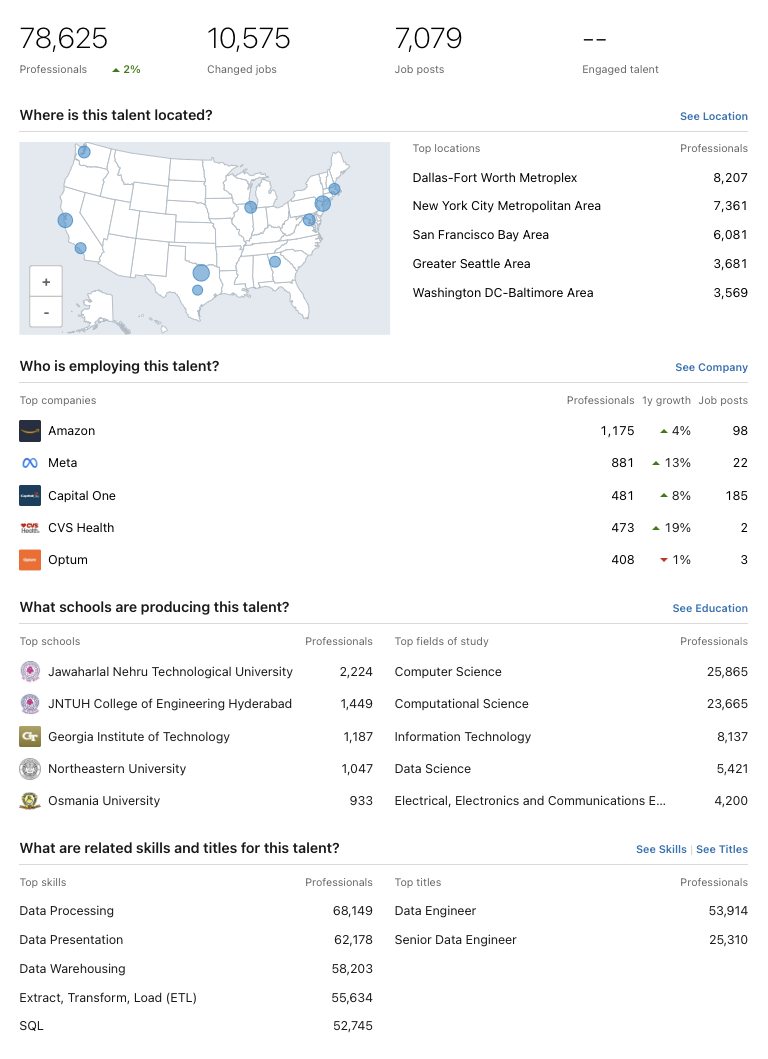The Growing Demand for Data Engineers in the USA: Insights from the Talent Pool
As an AI enthusiast and writer for the People in AI blog, I'm always eager to dive into the latest data and insights on emerging technology roles. Recently, I had the opportunity to explore the talent pool for data engineers in the United States using LinkedIn's Talent Insights. The findings paint an exciting picture of this in-demand profession - one that is primed for growth and ripe with opportunities.
Data Engineer Job Market Insights
Let's start with the basics. According to LinkedIn, there are currently 78,625 data engineering professionals based in the US. This talent pool has seen a 2% increase over the past year, indicating steady expansion. What's perhaps most noteworthy is the level of job activity - over 10,500 data engineers changed jobs in the last 12 months, and there are 7,079 open job postings for this role.
Gender Diversity in Data Engineering
Looking at the gender breakdown, the data engineering field remains male-dominated, with 69% of professionals identifying as men and 31% as women. This points to an opportunity for the industry to attract and retain more diverse talent, which can bring valuable perspectives and innovations to the field. Companies and educational institutions should focus on initiatives that encourage women and underrepresented groups to pursue careers in data engineering.
Top Companies Hiring Data Engineers
Looking at the companies employing this talent, it's no surprise to see tech giants like Amazon (1,175 data engineers), Meta (881), and Capital One (481) leading the way. However, the data also reveals strong representation from healthcare players like CVS Health (473) and Optum (408). This suggests that the need for data expertise is permeating across industries as organizations strive to derive insights from their burgeoning data assets.
Educational Background of Data Engineers
When it comes to the educational background of data engineers, the top feeder schools include Jawaharlal Nehru Technological University, JNTUH College of Engineering Hyderabad, and Georgia Institute of Technology. Computer science, computational science, and information technology are among the most common fields of study. This aligns with the core technical skills required for data engineering, which the LinkedIn data highlights as data processing, data presentation, data warehousing, ETL, and SQL.
In-Demand Data Engineering Skills
Digging deeper into the skills landscape, we see some interesting trends emerging. While foundational abilities like data processing, data modeling, and Python programming remain in high demand, there is also surging interest in newer technologies like infrastructure as code (IaC), Azure SQL, Azure Databricks, and Terraform. This points to the evolving nature of the data engineering discipline, with practitioners needing to stay agile and expand their toolkits to meet the dynamic needs of data-driven organizations.
Data Engineer Salaries and Compensation
When it comes to compensation, the data paints a lucrative picture for data engineers. The average salary for a data engineer in the US is $160,500, with top-paying companies like Meta offering an average of $195,800. However, there are some regional variations - the Greater Seattle Area, for instance, has an average data engineer salary of $160,800. Additionally, certain industries like financial services and banking tend to offer higher compensation compared to others.
Talent Flow and Migration Trends
The talent flow data also provides intriguing insights. Over the past year, the Dallas-Fort Worth metroplex has seen a net gain of 32 data engineers, while New York City and San Francisco have experienced modest declines of 9 and 3 professionals, respectively. This could be attributed to factors like cost of living, availability of jobs, and regional economic trends. Interestingly, the Greater Hyderabad Area in India has emerged as a significant source of talent, with a 122-person net gain for the Dallas-Fort Worth region.
The Future of Data Engineering in the USA
So, what does all of this mean for the future of data engineering in the US? The signs point to a thriving and dynamic job market, fueled by the relentless demand for data-driven insights across industries. As organizations continue to invest in their data capabilities, the need for skilled data engineers will only grow. And with emerging technologies like cloud, automation, and machine learning reshaping the field, data engineers will need to continuously evolve their skills to stay ahead of the curve.
For those aspiring to join this in-demand profession, the path forward is clear - focus on developing a robust technical skill set, stay abreast of the latest tools and trends, and be prepared to navigate a competitive, yet rewarding job market. The data engineer role is poised to remain a cornerstone of the modern digital landscape, and those who can embrace the challenge will be well-positioned to thrive in this ever-evolving field.
If you're interested in exploring the latest trends and insights in the world of AI and data engineering, be sure to join the People in AI community. As a hub for AI enthusiasts and professionals, we're dedicated to fostering knowledge-sharing, collaboration, and career advancement in this exciting and rapidly evolving industry.
















